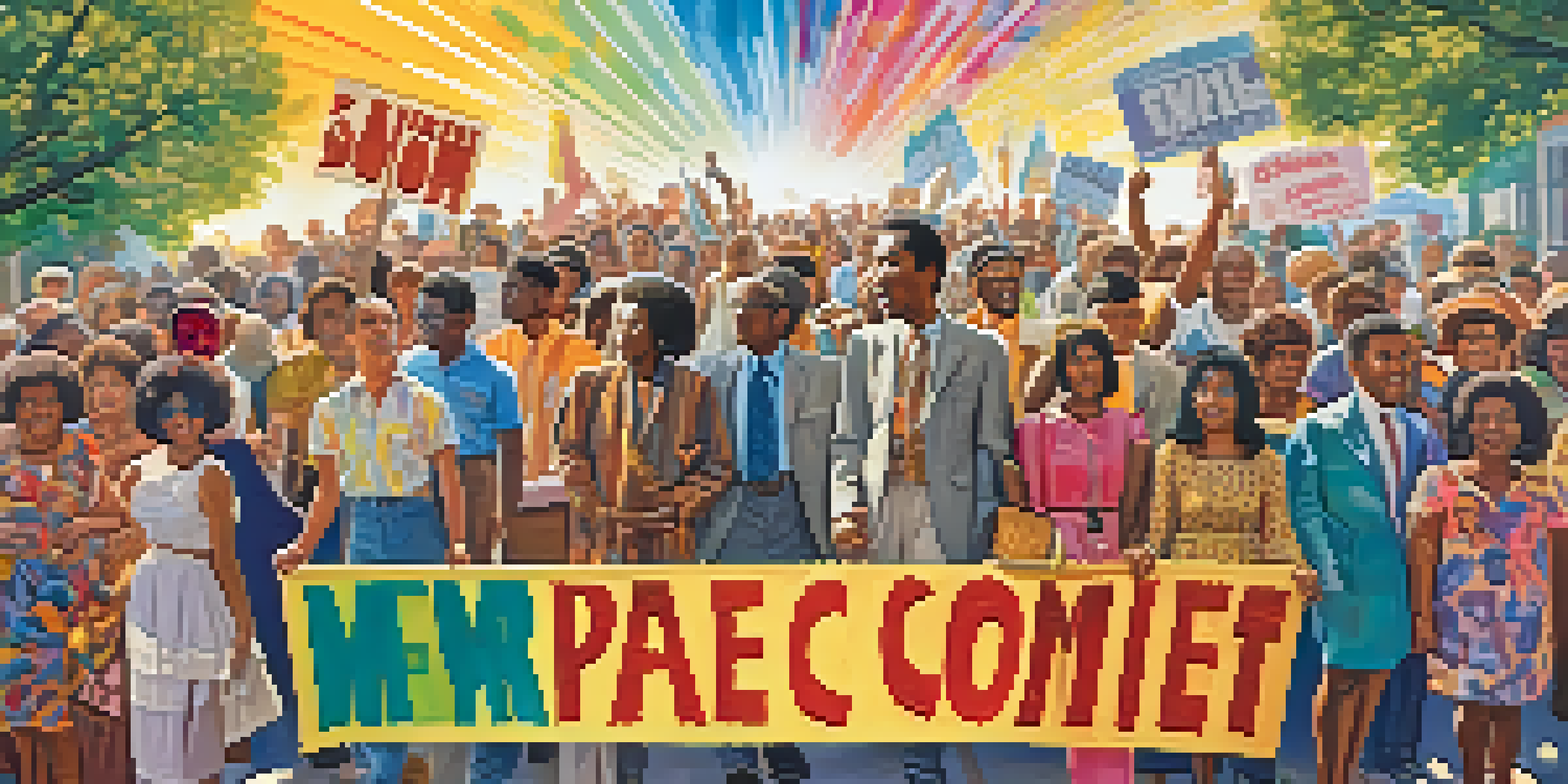Psychedelics and Protest: A Historical Perspective on Activism

The Origins of Psychedelics in Activism
Psychedelics have a long history, deeply intertwined with various cultural practices and spiritual ceremonies. Ancient civilizations, such as the Aztecs and Amazonian tribes, used substances like peyote and ayahuasca for healing and enlightenment. This historical backdrop laid the foundation for the later adoption of psychedelics in the 20th century, particularly during periods of social upheaval.
The psychedelic experience can teach us that we are all connected, that we are all part of the same universe.
As the counterculture movement of the 1960s gained momentum, many activists turned to psychedelics as tools for expanding consciousness and challenging societal norms. The belief was that these substances could unlock new ways of thinking, promoting peace and understanding amidst the chaos of the Vietnam War and civil rights struggles. This connection between psychedelics and activism began to take shape, creating a fascinating synergy.
One of the most notable figures in this movement was Timothy Leary, a psychologist who famously encouraged people to 'turn on, tune in, drop out.' His advocacy for psychedelics as a means of personal and societal transformation helped to frame them as instruments of protest, thereby solidifying their role in the activist landscape.
Psychedelics and the Civil Rights Movement
The civil rights movement of the 1960s was pivotal in shaping modern activism, and psychedelics played an unexpected role. As activists sought new strategies to combat systemic racism and inequality, some turned to psychedelics for inspiration and insight. The exploration of altered states of consciousness offered fresh perspectives on deeply entrenched social issues, contributing to the movement's innovative approaches.

Notably, figures like Aldous Huxley, who wrote extensively about the benefits of psychedelics, influenced many civil rights leaders. His work encouraged activists to consider the psychological dimensions of their struggle, promoting the idea that personal liberation was intrinsically linked to collective freedom. This philosophical approach resonated with many, merging the quest for civil rights with the exploration of consciousness.
Psychedelics Fuel Activism's Roots
Psychedelics have historically been intertwined with activism, serving as tools for expanding consciousness and challenging societal norms.
Moreover, gatherings where psychedelics were used became spaces for dialogue and solidarity, fostering a sense of community among activists. These experiences often sparked creative strategies and united diverse groups in a shared cause, demonstrating how psychedelics could enhance empathy and understanding in the fight for justice.
Psychedelics in Anti-War Protests
As the Vietnam War escalated, protests became a common response from those opposed to the conflict. Many activists embraced psychedelics not just for personal exploration, but as a means to amplify their anti-war messages. The use of these substances became synonymous with a broader push for peace, leading to the iconic phrase 'Make love, not war.'
Turn on, tune in, drop out.
Psychedelics facilitated experiences of unity and interconnectedness, encouraging protesters to see the war's human cost beyond their immediate surroundings. This shift in perspective played a vital role in galvanizing anti-war sentiment, allowing individuals to empathize with those affected by the conflict, both abroad and at home.
Rallies and protests often featured music, art, and other forms of expression that highlighted the psychedelic experience. These cultural elements not only drew attention to the anti-war movement but also created a vibrant atmosphere of resistance, merging the psychedelic experience with activism in a powerful and unforgettable way.
The Role of Psychedelics in Environmental Activism
The environmental movement, which gained significant traction in the late 20th century, also intersected with psychedelic culture. Activists began to realize that the expanded consciousness facilitated by psychedelics could lead to a deeper appreciation for nature and the urgency of ecological issues. This connection has inspired many to advocate for sustainable practices and environmental protection.
Psychedelics often evoke experiences of oneness with the planet, prompting individuals to reflect on their relationship with the environment. This profound sense of interconnectedness has spurred many activists to adopt more holistic approaches to environmentalism, advocating for not just policy change, but a fundamental shift in how society perceives its role within the ecosystem.
Psychedelics Inspired Social Movements
During pivotal moments like the civil rights and anti-war movements, psychedelics provided fresh perspectives and fostered empathy among activists.
Additionally, events like the Earth Day celebration have incorporated elements of psychedelic culture, using art and music to promote environmental awareness. These gatherings serve as a reminder of the power of collective consciousness, demonstrating how psychedelics can inspire action for the planet's future.
The Legal Battle Over Psychedelics and Activism
Despite their potential benefits, psychedelics have faced significant legal challenges, particularly since the Controlled Substances Act of 1970. This legislation categorized many psychedelics as Schedule I drugs, effectively criminalizing their use and limiting research. Activists have fought tirelessly to overturn these restrictions, arguing that psychedelics can play a crucial role in healing and social change.
In recent years, there has been a resurgence of interest in the therapeutic potential of psychedelics, leading to a wave of activism aimed at reforming drug laws. Grassroots organizations have emerged, advocating for decriminalization and the responsible use of psychedelics, emphasizing their role in mental health treatment and personal development.
This legal battle highlights the ongoing struggle for personal freedoms and the right to explore consciousness through psychedelics. Activists continue to push for change, drawing parallels between the fight for drug policy reform and other social justice movements, reinforcing the idea that access to psychedelics is a matter of civil rights.
Modern Psychedelic Activism and Its Evolution
Today, the landscape of psychedelic activism has evolved, incorporating a diverse range of voices and perspectives. From academic researchers to grassroots activists, there is a growing consensus around the need for a more compassionate approach to psychedelics. This shift reflects a broader cultural change, as society begins to reevaluate its relationship with these substances.
Organizations like MAPS (Multidisciplinary Association for Psychedelic Studies) are at the forefront of this movement, advocating for evidence-based research and policy reform. Their work emphasizes the therapeutic potential of psychedelics, particularly in treating conditions such as PTSD, depression, and anxiety, thereby bridging the gap between activism and science.
Modern Activism Advocates for Change
Today's psychedelic activism emphasizes inclusivity and the therapeutic potential of these substances, advocating for policy reform and social justice.
Moreover, modern activism is increasingly focused on inclusivity, ensuring that marginalized communities have a voice in the conversation surrounding psychedelics. This emphasis on equity reflects a commitment to social justice, acknowledging the historical injustices faced by communities disproportionately affected by the war on drugs.
The Future of Psychedelics and Protest
As we look toward the future, the relationship between psychedelics and activism remains dynamic and complex. With ongoing research highlighting their potential benefits, there is hope for a paradigm shift in public perception and policy. However, this change requires continued advocacy and education to dismantle the stigma surrounding psychedelics.
Moreover, the influence of psychedelics on social movements is likely to expand, as activists explore new ways to integrate these substances into their work. The quest for personal and collective liberation will continue to inspire creative approaches to activism, making psychedelics a vital part of the ongoing dialogue around social change.

Ultimately, the future of psychedelics and protest will depend on the ability of activists to unite around shared goals, fostering a community that values both personal exploration and collective action. In this way, psychedelics may not only serve as tools for individual insight but also as catalysts for transformative societal change.